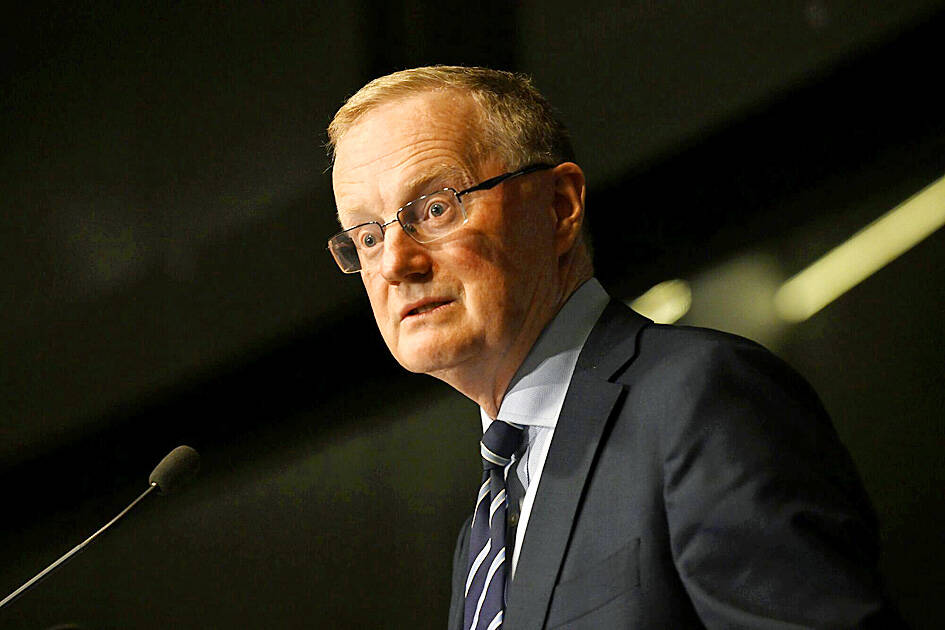Australia’s central bank yesterday hiked interest rates to an 11-year high and warned that further increases might be on the horizon to get surging prices under control.
The Reserve Bank of Australia lifted the key rate 25 basis points to 4.1 percent, its highest level since May 2012, with Governor Philip Lowe saying inflation had “passed its peak.” but was still stubbornly high.
Most analysts surveyed by Bloomberg had forecast that officials would stand pat, while the announcement saw the Ausralian dollar jump more than 1 percent against the US dollar.

Photo: Bloomberg
However, stocks sank about 1 percent in Sydney.
“This further increase in interest rates is to provide greater confidence that inflation will return to target within a reasonable time frame,” Lowe said in a statement.
“High inflation makes life difficult for people and damages the functioning of the economy,” he added.
Government figures released last week showed prices surged 6.8 percent in April, up from 6.3 percent in March, outstripping previous forecasts that suggested a drop.
“Recent data indicate that the upside risks to the inflation outlook have increased and the board has responded to this,” Lowe said.
The latest rate hike heaps further pressure on mortgage holders who are, on average, already forking out hundreds of Australian dollars more each month to meet their repayments.
Lowe said that many Australian households were feeling a “painful squeeze on their finances.”
“Some further tightening of monetary policy may be required to ensure that inflation returns to target in a reasonable time frame, but that will depend upon how the economy and inflation evolve,” he said.
The decision comes after the independent Fair Work Commission lifted the national minimum wage by 5.75 percent starting July 1.

The New Taiwan dollar is on the verge of overtaking the yuan as Asia’s best carry-trade target given its lower risk of interest-rate and currency volatility. A strategy of borrowing the New Taiwan dollar to invest in higher-yielding alternatives has generated the second-highest return over the past month among Asian currencies behind the yuan, based on the Sharpe ratio that measures risk-adjusted relative returns. The New Taiwan dollar may soon replace its Chinese peer as the region’s favored carry trade tool, analysts say, citing Beijing’s efforts to support the yuan that can create wild swings in borrowing costs. In contrast,

Nvidia Corp’s demand for advanced packaging from Taiwan Semiconductor Manufacturing Co (TSMC, 台積電) remains strong though the kind of technology it needs is changing, Nvidia CEO Jensen Huang (黃仁勳) said yesterday, after he was asked whether the company was cutting orders. Nvidia’s most advanced artificial intelligence (AI) chip, Blackwell, consists of multiple chips glued together using a complex chip-on-wafer-on-substrate (CoWoS) advanced packaging technology offered by TSMC, Nvidia’s main contract chipmaker. “As we move into Blackwell, we will use largely CoWoS-L. Of course, we’re still manufacturing Hopper, and Hopper will use CowoS-S. We will also transition the CoWoS-S capacity to CoWos-L,” Huang said

Nvidia Corp CEO Jensen Huang (黃仁勳) is expected to miss the inauguration of US president-elect Donald Trump on Monday, bucking a trend among high-profile US technology leaders. Huang is visiting East Asia this week, as he typically does around the time of the Lunar New Year, a person familiar with the situation said. He has never previously attended a US presidential inauguration, said the person, who asked not to be identified, because the plans have not been announced. That makes Nvidia an exception among the most valuable technology companies, most of which are sending cofounders or CEOs to the event. That includes

INDUSTRY LEADER: TSMC aims to continue outperforming the industry’s growth and makes 2025 another strong growth year, chairman and CEO C.C. Wei says Taiwan Semiconductor Manufacturing Co (TSMC, 台積電), a major chip supplier to Nvidia Corp and Apple Inc, yesterday said it aims to grow revenue by about 25 percent this year, driven by robust demand for artificial intelligence (AI) chips. That means TSMC would continue to outpace the foundry industry’s 10 percent annual growth this year based on the chipmaker’s estimate. The chipmaker expects revenue from AI-related chips to double this year, extending a three-fold increase last year. The growth would quicken over the next five years at a compound annual growth rate of 45 percent, fueled by strong demand for the high-performance computing